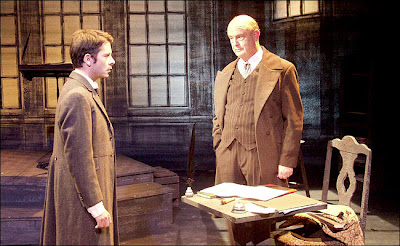Melville Meltdown

For brevity's sake I will only discuss the work I had to read for our panel discussions in American Literature class. First off let me say, the professor I have for this course is a complete hermit and rambunctous nazi about the American Literary Canon however, whatever intimations she has arrived at in her own reading of our texts forbid to the beautiful art that is equivocation. Put simply, she's another English Major teaching her own presumptions about the texts. Anyway, I decided to write about Melville because I left his text "Bartleby, the Scrivener" feeling pretty disconcerted. After getting over the initial pragmatism of this story, I found myself agonizing because like many of these older American authors, by the sheer amount of phrases it took him to get to a point, I knew he was being paid by the word. Cha ching. I mean I guessed I would take hours to articulate blowing my nose in the artistic of expressive modes if I could somehow relate that to the metaphysical relationship of man's parting with unnecessary worldly attachments. However, I did not feel these sort of convictions about the unnamed narrator and the subject of his narration, a passively obstinate worker of his named Bartleby. The majority of the story is spent discussing the goings-on of the office of which the narrator is the lawyer and from a job hierarchy standpoint, the boss of the place. And when the time came that he needed to get some extra help to balance out his more difficult tasks of copying he hired an extra hand. All seemed well for the first few moments and then one day the narrator asked for Bartleby's checking his copies and he refused. It seemed a very odd story to me. Ah, look at it working its voodoo on me. I'm inverting my subject and predicates. Stupid Herman Melville. Anyway, the story continued that Bartleby refused to do even the most menial of tasks his boss requested, because he "preferred not to." It all seemed a bit strange to me, if not highly far-fetched. But the narrator goes through great difficulty to gain the cooperation of Bartleby but despite his efforts the scrivener remained noncompliant. Eventually, the narrator resolved to fire Bart and move to another office after the law copyist refused to leave. In the end, Bartleby goes to prison for trespassing and dies of probably some combination of loneliness and starvation. After 20 pages of the same kinds of things occuring I wanted a bigger release than the narrator's reciprocated passive-aggressive motion of simply leaving. I was left eavesdropping in the backstage wing of the theatre waiting on some dramatic climax to occur where the narrator snapped like he would have in a Edgar Allan Poe story or lit something on fire like in William Faulkner. The story left me wholly dissatisfied and while I might see some of what the editor calls "addressed some of the issues of social transformations brought about by the rise of industrial capitalism," the construction of Herman Melville upset me. The displacement of two unmotivated characters and their journey to apathetic resolution bothers me as a reader and insults me a writer. Bad form Herman Melville. Bad form.


Comments
Post a Comment
Honest opinions are always welcome